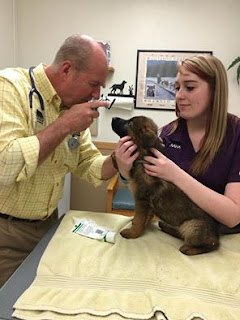As little as a single Aleve tablet can be deadly. As tempting as it may be to reach for the
Aleve or Ibuprofen when we see our pets in pain, it is a terrible idea! Aleve, Ibuprofen, Tylenol and even Asprin can
be extremely dangerous and even deadly to pets.
These medications are also commonly flavored or encompassed in a sweet
coating, making them even more tempting for our companions. If you are concerned that your companion may
have ingested any human medication, contact your veterinarian or the Pet Poison
Hotline at 855-764-7661 immediately.
A
dog that appears to be gagging or vomiting but doesn’t produce anything is very
concerning. Gastric Dilatation and Volvulus
(GDV), sometimes referred to as “Bloat” is one of the most serious
non-traumatic emergencies we see. This
happens when the stomach or other part of the GI tract twists and reduces or
stops the flow of blood. If this issue
is not addressed quickly, the pet can pass in a matter of hours. The majority of pets with GDV require
surgical intervention to restore bloodflow to their GI system. Symptoms may include unproductive vomiting,
restlessness, increased breathing rate or effort, excessive drooling, or
listlessness. As the condition
progresses you many notice the dog’s abdomen becoming enlarged, pale gums, high
heart rate or the pet collapsing.
Pets that are struggling to urinate may be in more danger
than you think. Although this is most
common in male cats, it is occasionally seen in other pets. Male cats are notorious for having urethral
obstructions that prevent them from urinating normally, or at all. This can become a very serious issue the
longer it is left untreated. Often
owners observe their pets trying to urinate frequently with out producing
anything or only drips, in and out of the litter box often, or urinating
inappropriately outside of the box.
Pet’s often express discomfort vocally or become reclusive and as the
condition progresses begin vomiting and become lethargic.
- Ingestion of People Food
 As pet owners, we love to share our food with our pets,
especially when they show us those cute puppy dog eyes. Be cautious what you share, because some
foods can be toxic to our furry and feathered friends! To top this list, Chocolate. Chocolate is derived from the roasted seeds
of Theobroma cacao, which contains certain properties that can be toxic to
animals: caffeine and theobromine. If ingested, these two ingredients can also
lead to various medical complications and may even prove fatal for your
dog. Goodies that contain higher amounts
of cacao are most dangerous, such as dark chocolate bars and home made
goodies. For a list of other toxic
foods, please visit
http://www.aspca.org/pet-care/animal-poison-control/people-foods-avoid-feeding-your-pets
As pet owners, we love to share our food with our pets,
especially when they show us those cute puppy dog eyes. Be cautious what you share, because some
foods can be toxic to our furry and feathered friends! To top this list, Chocolate. Chocolate is derived from the roasted seeds
of Theobroma cacao, which contains certain properties that can be toxic to
animals: caffeine and theobromine. If ingested, these two ingredients can also
lead to various medical complications and may even prove fatal for your
dog. Goodies that contain higher amounts
of cacao are most dangerous, such as dark chocolate bars and home made
goodies. For a list of other toxic
foods, please visit
http://www.aspca.org/pet-care/animal-poison-control/people-foods-avoid-feeding-your-pets
Our feathered friends don’t often show when they are not
feeling well. As a prey species, they
know if they are showing a vulnerability to a predator, they will be
eaten. This is an important piece of
knowledge when caring for birds because once we realize they are not feeling
well, it is a very serious situation.
Birds that are observed being ‘fluffed up’ or remaining on the bottom of
their cage unusually should be seen by a veterinarian as soon as possible.















